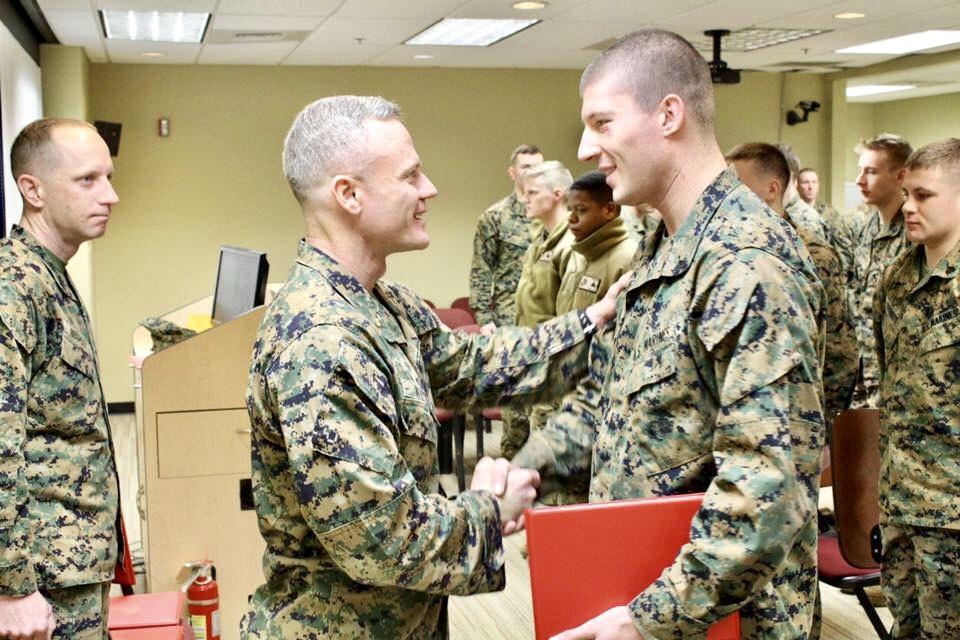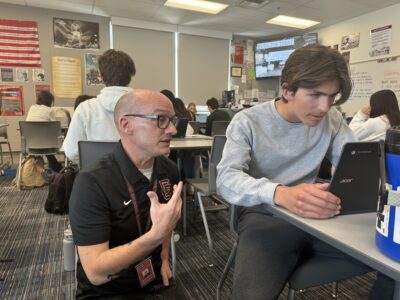Jason Gardner came into the world with a family who didn’t want him.
His biological mother, a 13-year-old addicted to amphetamine, and his biological father, a man double his mother’s age, did not have a home to shelter their newborn son.
He was found by sheriff’s officials, cold, with nothing and barely anyone to care for him.
But his great-aunt Debbie, when Gardner was still too young to remember, decided to take him in and give him a loving home and a loving family.
He was adopted, and he loves his adopted family. By all accounts — from him, his fiance and his extended family — he is as much a Gardner as anyone.
However, he would find another family. Not to replace the Gardners — whom he would never call his “adopted family” — but one that can only be found once you become an adult.
He would find brotherhood in the U.S. Marine Corps.


Early Life
Gardner was born March 5, 1994, in a Lancaster-area hospital, and almost from the moment he was born, he would be placed in child protective services.
“My biological mom was maybe 13 or 14 years old when she had me,” said Gardner. “She was addicted to a bunch of drugs and she didn’t want me.”
However, Gardner found his way into the home of Debbie and Dirk Gardner, who would eventually adopt him.
“Dad owns a construction company and mom is a homemaker,” said Gardner.
While growing up he played a lot of sports, from baseball to basketball to riding his bike around. And, as the youngest of four children, with his three older siblings being girls, he had to find people around the block to play with.
“We really got into Airsoft,” said Gardner, reflecting on his childhood memories. “My sisters … they really didn’t want to play with me,” he said, with one of his light laughs that characterizes much of his interview.
Gardner received the typical Santa Clarita experience, growing up going to school at Castaic Elementary, then Castaic Middle School, always getting the gang back together again after school to set up their next Airsoft war games or ride somewhere on bikes for a pick-up game of hoops.
Once he entered Valencia High School, he joined JROTC, putting him on the path toward fulfilling what had been a lifelong dream.
“I always knew … since I was 8 years old,” said Gardner. “You know, I was always playing ‘Army,’ and I remember, still to this day, the first time I went dressed as an ‘Army guy’ for Halloween.”
Gardner was in Valencia’s JROTC program for four years, drilling and prepping regularly for what would be coming right around the corner.


San Diego
“When you’re a kid, you don’t really know about the different branches of the military,” Gardner said. “I just liked to watch the movies.”
However, on June 11, 2012, Gardner would make the decision to join the U.S. Marine Corps. And, because of his time in JROTC, he was enlisted as an E-2 Private First Class.
For his first stop in what would become a military trek across the country, Gardner headed to San Diego to do his basic training.
“The first phase was hell in a handbasket,” said Gardner. “It’s made to be chaotic. It’s made to be stressful. I was kind of used to it already because of JROTC, but basic (training) was still a life-changing experience.”
After basic training, he was sent to Camp Pendleton, where he worked with the Infantry Training Battalion (ITB) to train and qualify as a member of the Marine Infantry for his Military Occupational Specialty.
“It was a lot, a lot of hiking and running around in heavy gear, and a lot of shooting,” said Gardner. “Being a rifleman is the backbone of supporting the infantry.”
Gardner said that while there, he learned a lot about dismissing preconceptions he had before joining the military.
“Funny enough, everyone thinks the Marine Corps is made up of these big and strong dudes,” Gardner said after he noted that his platoon would hike sometimes 15 miles a day with over 100 pounds of gear strapped to their backs. “But really what the (Marine Corps) wants is smaller, more slim; guys who have better cardio and can run around. … They’re going to break you down mentally and physically, so that when you’re tired, your body is going to be able to tell you what to do.”


Camp David
While he was in basic training, Gardner had taken an aptitude test alongside the hundreds of other Marines he had been working with during boot camp.
“I got recruited for a specific job” for what would become his primary role during his military service, he’ll say. “All the infantry Marines got brought on, and (the commanding officers) scrutinize everything.”
Following a psych evaluation and ITB training, the hundreds of recruits for the special detail — security forces — was boiled down to eight young Marines, Gardner among them.
He was sent to Norfolk, Virginia, and eventually Washington, D.C., where he learned to do a security detail, guarding everything from the first Marine outpost in U.S. history to the highest echelon of generals and commanders of the U.S. military.
“They wouldn’t let us lean or sit at all,” said Gardner. “In boots and cammies, that wouldn’t be too bad. But we were in our dress uniforms. At the end of a 12-hour shift, your feet would be burning.”
If standing at attention for the commandant wasn’t stressful enough, Gardner was eventually tapped to stand guard in the woods. But these woods and cabins he stood at attention at, with his feet burning and stuffy uniform itching, were no ordinary woods and/or cabins.


It was Camp David.
First used by President Franklin Delano Roosevelt, Camp David has been used for close to a century’s worth of commanders-in-chief and who’s who of American leaders.
Officially known as the Naval Support Facility Thurmont, because it’s technically a military installation, monumental military operations such as D-Day, the Vietnam War and the invasion of Iraq have all been planned on the various patios and couches of Camp David.
And, from 2014-17, any major decision made by President Barack Obama would have been guarded by a Marine like Gardner.
He can’t tell you much about his time at Camp David except that he saw a number of dignitaries from around Washington and the world, come and go; that the quality of the food he ate depended on if someone was visiting the base; and that Camp David really is just a bunch of cabins.
“They stayed in the cabins, and we stayed in these barracks kind of things that were more like dorms,” he said.
“I got to meet President Obama a couple times,” he said. “I never got to meet President (Donald) Trump because I was only there for the first couple of months of his presidency.”
Gardner said he was jealous when he saw his buddies from the Marine security service holding the doors open on inauguration day for President Trump at the White House.
“It’s up in the middle of nowhere (Camp David),” said Gardner. Beyond that, when pressed, he’s most likely going to say to you, “We’re not really supposed to say anything,” or “I can’t really talk about that,” or just simply, “it’s classified.”


Gardner
Gardner was discharged June 11, 2017, after serving exactly five years in the Marines. He was honorably discharged as an E-5 sergeant with a Presidential Unit Citation, along with a number of other commendations.
He earned a “surgical with a pistol” commendation as a “Pistols Expert.” After guarding the president for years, armed only with a handgun, Gardner worked in private security work for a while.
“I protected a bunch of A-list celebrities and bunch of people who ‘had something to lose,’” right before he tells you he can’t divulge any of their names.
But now he works as an engineer in the Woodland Hills area, working closely with his family and fiancee to plan his wedding. He’s set to be married Nov. 2, and seems elated.
When you ask him why he’s so family-oriented in his civilian life, it seems to tie in with why he went into the military and what appears to be his biggest takeaway from the service.
“It’s commonplace to lay into somebody in the military, and talk trash at each other,” said Gardner. “That’s just how it is, but eventually, you get to know the guys. They become your brothers, and you can communicate with them in ways you can’t (in the civilian world).”
He still regularly hangs out with the guys from the service, still carries on old habits with them joke and pick at one another from time to time. His future wife is close with all them, and they regularly go line dancing or out for drinks with one another.
In other words: He sticks with his family.










